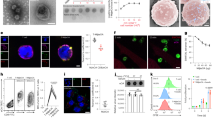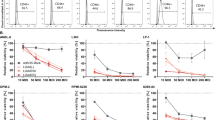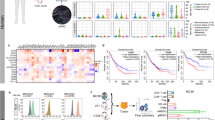Abstract
Promising clinical results have been achieved with monoclonal antibodies (mAbs) such as ipilimumab and tremelimumab that block cytotoxic T lymphocyte-associated antigen-4 (CTLA-4, CD152). However, systemic administration of these agents also has the potential for severe immune-related adverse events. Thus, local production might allow higher concentrations at the target while reducing systemic side effects. We generated a transductionally and transcriptionally targeted oncolytic adenovirus Ad5/3-Δ24aCTLA4 expressing complete human mAb specific for CTLA-4 and tested it in vitro, in vivo and in peripheral blood mononuclear cells (PBMCs) of normal donors and patients with advanced solid tumors. mAb expression was confirmed by western blotting and immunohistochemistry. Biological functionality was determined in a T-cell line and in PBMCs from cancer patients. T cells of patients, but not those of healthy donors, were activated by an anti-CTLA4mAb produced by Ad5/3-Δ24aCTLA4. In addition to immunological effects, a direct anti-CTLA-4-mediated pro-apoptotic effect was observed in vitro and in vivo. Local production resulted in 43-fold higher (P<0.05) tumor versus plasma anti-CTLA4mAb concentration. Plasma levels in mice remained below what has been reported safe in humans. Replication-competent Ad5/3-Δ24aCTLA4 resulted in 81-fold higher (P<0.05) tumor mAb levels as compared with a replication-deficient control. This is the first report of an oncolytic adenovirus producing a full-length human mAb. High mAb concentrations were seen at tumors with lower systemic levels. Stimulation of T cells of cancer patients by Ad5/3-Δ24aCTLA4 suggests feasibility of testing the approach in clinical trials.
This is a preview of subscription content, access via your institution
Access options
Subscribe to this journal
Receive 12 print issues and online access
$259.00 per year
only $21.58 per issue
Buy this article
- Purchase on Springer Link
- Instant access to full article PDF
Prices may be subject to local taxes which are calculated during checkout






Similar content being viewed by others
References
Dranoff G . Cytokines in cancer pathogenesis and cancer therapy. Nat Rev Cancer 2004; 4: 11–22.
de Visser KE, Eichten A, Coussens LM . Paradoxical roles of the immune system during cancer development. Nat Rev Cancer 2006; 6: 24–37.
Leach DR, Krummel MF, Allison JP . Enhancement of antitumor immunity by CTLA-4 blockade. Science 1996; 271: 1734–1736.
Kwon ED, Foster BA, Hurwitz AA, Madias C, Allison JP, Greenberg NM et al. Elimination of residual metastatic prostate cancer after surgery and adjunctive cytotoxic T lymphocyte-associated antigen 4 (CTLA-4) blockade immunotherapy. Proc Natl Acad Sci USA 1999; 96: 15074–15079.
Kirkwood JM, Lorigan P, Hersey P, Hauschild A, Robert C, McDermott D et al. Phase II trial of tremelimumab (CP-675206) in patients with advanced refractory or relapsed melanoma. Clin Cancer Res 2010; 16: 1042–1048.
Hodi FS, O’Day SJ, McDermott DF, Weber RW, Sosman JA, Haanen JB et al. Improved survival with ipilimumab in patients with metastatic melanoma. N Engl J Med 2010; 363: 711–723.
Ribas A, Hanson DC, Noe DA, Millham R, Guyot DJ, Bernstein SH et al. Tremelimumab (CP-675206), a cytotoxic T lymphocyte associated antigen 4 blocking monoclonal antibody in clinical development for patients with cancer. Oncologist 2007; 12: 873–883.
Lee KM, Chuang E, Griffin M, Khattri R, Hong DK, Zhang W et al. Molecular basis of T cell inactivation by CTLA-4. Science 1998; 282: 2263–2266.
Paradis TJ, Floyd E, Burkwit J, Cole SH, Brunson B, Elliott E et al. The antitumor activity of anti-CTLA-4 is mediated through its induction of IFN gamma. Cancer Immunol Immunother 2001; 50: 125–133.
Chambers CA, Kuhns MS, Egen JG, Allison JP . CTLA-4-mediated inhibition in regulation of T cell responses: mechanisms and manipulation in tumor immunotherapy. Annu Rev Immunol 2001; 19: 565–594.
Paust S, Lu L, McCarty N, Cantor H . Engagement of B7 on effector T cells by regulatory T cells prevents autoimmune disease. Proc Natl Acad Sci USA 2004; 101: 10398–10403.
Munn DH, Sharma MD, Hou D, Baban B, Lee JR, Antonia SJ et al. Expression of indoleamine 2,3-dioxygenase by plasmacytoid dendritic cells in tumor-draining lymph nodes. J Clin Invest 2004; 114: 280–290.
Contardi E, Palmisano GL, Tazzari PL, Martelli AM, Fala F, Fabbi M et al. CTLA-4 is constitutively expressed on tumor cells and can trigger apoptosis upon ligand interaction. Int J Cancer 2005; 117: 538–550.
Jinushi M, Hodi FS, Dranoff G . Therapy-induced antibodies to MHC class I chain-related protein A antagonize immune suppression and stimulate antitumor cytotoxicity. Proc Natl Acad Sci USA 2006; 103: 9190–9195.
Sanderson K, Scotland R, Lee P, Liu D, Groshen S, Snively J et al. Autoimmunity in a phase I trial of a fully human anti-cytotoxic T-lymphocyte antigen-4 monoclonal antibody with multiple melanoma peptides and Montanide ISA 51 for patients with resected stages III and IV melanoma. J Clin Oncol 2005; 23: 741–750.
Russell WC . Update on adenovirus and its vectors. J Gen Virol 2000; 81: 2573–2604.
Kanerva A, Hemminki A . Modified adenoviruses for cancer gene therapy. Int J Cancer 2004; 110: 475–480.
Dias JD, Guse K, Nokisalmi P, Eriksson M, Chen DT, Diaconu I et al. Multimodal approach using oncolytic adenovirus, cetuximab, chemotherapy and radiotherapy in HNSCC low passage tumour cell cultures. Eur J Cancer 2009; 46: 625–635.
Rajecki M, Kanerva A, Stenman UH, Tenhunen M, Kangasniemi L, Sarkioja M et al. Treatment of prostate cancer with Ad5/3Delta24hCG allows non-invasive detection of the magnitude and persistence of virus replication in vivo. Mol Cancer Ther 2007; 6: 742–751.
Kanerva A, Wang M, Bauerschmitz GJ, Lam JT, Desmond RA, Bhoola SM et al. Gene transfer to ovarian cancer versus normal tissues with fiber-modified adenoviruses. Mol Ther 2002; 5: 695–704.
Särkioja M, Kanerva A, Salo J, Kangasniemi L, Eriksson M, Raki M et al. Noninvasive imaging for evaluation of the systemic delivery of capsid-modified adenoviruses in an orthotopic model of advanced lung cancer. Cancer 2006; 107: 1578–1588.
Fueyo J, Gomez-Manzano C, Alemany R, Lee PS, McDonnell TJ, Mitlianga P et al. A mutant oncolytic adenovirus targeting the Rb pathway produces anti-glioma effect in vivo. Oncogene 2000; 19: 2–12.
Heise C, Hermiston T, Johnson L, Brooks G, Sampson-Johannes A, Williams A et al. An adenovirus E1A mutant that demonstrates potent and selective systemic antitumoral efficacy. Nat Med 2000; 6: 1134–1139.
Sherr CJ . Cancer cell cycles. Science 1996; 274: 1672–1677.
Bauerschmitz GJ, Guse K, Kanerva A, Menzel A, Herrmann I, Desmond RA et al. Triple-targeted oncolytic adenoviruses featuring the cox2 promoter, E1A transcomplementation, and serotype chimerism for enhanced selectivity for ovarian cancer cells. Mol Ther 2006; 14: 164–174.
Kanerva A, Zinn KR, Chaudhuri TR, Lam JT, Suzuki K, Uil TG et al. Enhanced therapeutic efficacy for ovarian cancer with a serotype 3 receptor-targeted oncolytic adenovirus. Mol Ther 2003; 8: 449–458.
Greenwald RJ, Boussiotis VA, Lorsbach RB, Abbas AK, Sharpe AH . CTLA-4 regulates induction of anergy in vivo. Immunity 2001; 14: 145–155.
Krummel MF, Allison JP . CTLA-4 engagement inhibits IL-2 accumulation and cell cycle progression upon activation of resting T cells. J Exp Med 1996; 183: 2533–2540.
Kanerva A, Zinn KR, Peng KW, Ranki T, Kangasniemi L, Chaudhuri TR et al. Noninvasive dual modality in vivo monitoring of the persistence and potency of a tumor targeted conditionally replicating adenovirus. Gene therapy 2005; 12: 87–94.
Kennedy MA, Parks RJ . Adenovirus virion stability and the viral genome: size matters. Mol Ther 2009; 17: 1664–1666.
Ribas A . Anti-CTLA4 antibody clinical trials in melanoma. Update Cancer Ther 2007; 2: 133–139.
Hanson DC, Canniff PC, Primiano MJ et al. Preclinical in vitro characterization of anti-CTLA4 therapeutic antibody CP-675206. Proc Am Assoc Cancer Res 2004; 45: abstract #3802.
Weber JS, O’Day S, Urba W, Powderly J, Nichol G, Yellin M et al. Phase I/II study of ipilimumab for patients with metastatic melanoma. J Clin Oncol 2008; 26: 5950–5956.
Ribas A, Camacho LH, Lopez-Berestein G, Pavlov D, Bulanhagui CA, Millham R et al. Antitumor activity in melanoma and anti-self responses in a phase I trial with the anti-cytotoxic T lymphocyte-associated antigen 4 monoclonal antibody CP-675206. J Clin Oncol 2005; 23: 8968–8977.
Tarhini AA, Iqbal F . CTLA-4 blockade: therapeutic potential in cancer treatments. Onco Targets Ther 2010; 3: 15–25.
Stagg J, Johnstone RW, Smyth MJ . From cancer immunosurveillance to cancer immunotherapy. Immunol Rev 2007; 220: 82–101.
Parkin DM, Bray F, Ferlay J, Pisani P . Global cancer statistics, 2002. CA Cancer J Clin 2005; 55: 74–108.
Harvey BG, Maroni J, O’Donoghue KA, Chu KW, Muscat JC, Pippo AL et al. Safety of local delivery of low- and intermediate-dose adenovirus gene transfer vectors to individuals with a spectrum of morbid conditions. Hum Gene Ther 2002; 13: 15–63.
Dias JD, Liikanen I, Guse K, Foloppe J, Sloniecka M, Diaconu I et al. Targeted chemotherapy for head and neck cancer with a chimeric oncolytic adenovirus coding for bifunctional suicide protein FCU1. Clin Cancer Res 2010; 16: 2540–2549.
Cerullo V, Pesonen S, Diaconu I, Escutenaire S, Arstila PT, Ugolini M et al. Oncolytic adenovirus coding for granulocyte macrophage colony-stimulating factor induces antitumoral immunity in cancer patients. Cancer Res 2010; 70: 4297–4309.
Koski A, Kangasniemi L, Escutenaire S, Pesonen S, Cerullo V, Diaconu I et al. Treatment of cancer patients with a serotype 5/3 chimeric oncolytic adenovirus expressing GMCSF. Mol Ther 2010; 18: 1874–1884.
Ribas A, Hauschild A, Kefford R et al. Phase III, open-label, randomized, comparative study of tremelimumab (CP-675206) and chemotherapy (temozolomide [TMZ] or dacarbazine [DTIC]) in patients with advanced melanoma. J Clin Oncol 2008; 26 (Suppl): abstract LBA9011.
Simmons AD, Moskalenko M, Creson J, Fang J, Yi S, VanRoey MJ et al. Local secretion of anti-CTLA-4 enhances the therapeutic efficacy of a cancer immunotherapy with reduced evidence of systemic autoimmunity. Cancer Immunol Immunother 2008; 57: 1263–1270.
Mokyr MB, Kalinichenko T, Gorelik L, Bluestone JA . Realization of the therapeutic potential of CTLA-4 blockade in low-dose chemotherapy-treated tumor-bearing mice. Cancer Res 1998; 58: 5301–5304.
Wolchok JD, Saenger Y . The mechanism of anti-CTLA-4 activity and the negative regulation of T-cell activation. Oncologist 2008; 13 (Suppl 4): 2–9.
Bruggemann M, Williams GT, Bindon CI, Clark MR, Walker MR, Jefferis R et al. Comparison of the effector functions of human immunoglobulins using a matched set of chimeric antibodies. J Exp Med 1987; 166: 1351–1361.
McCart JA, Puhlmann M, Lee J, Hu Y, Libutti SK, Alexander HR et al. Complex interactions between the replicating oncolytic effect and the enzyme/prodrug effect of vaccinia-mediated tumor regression. Gene Ther 2000; 7: 1217–1223.
Nakamura H, Mullen JT, Chandrasekhar S, Pawlik TM, Yoon SS, Tanabe KK . Multimodality therapy with a replication-conditional herpes simplex virus 1 mutant that expresses yeast cytosine deaminase for intratumoral conversion of 5-fluorocytosine to 5-fluorouracil. Cancer Res 2001; 61: 5447–5452.
Bashey A, Medina B, Corringham S, Pasek M, Carrier E, Vrooman L et al. CTLA4 blockade with ipilimumab to treat relapse of malignancy after allogeneic hematopoietic cell transplantation. Blood 2009; 113: 1581–1588.
Vonderheide RH, LoRusso PM, Khalil M, Gartner EM, Khaira D, Soulieres D et al. Tremelimumab in combination with exemestane in patients with advanced breast cancer and treatment-associated modulation of inducible costimulator expression on patient T cells. Clin Cancer Res 2010; 16: 3485–3494.
Tuve S, Chen BM, Liu Y, Cheng TL, Toure P, Sow PS et al. Combination of tumor site-located CTL-associated antigen-4 blockade and systemic regulatory T-cell depletion induces tumor-destructive immune responses. Cancer Res 2007; 67: 5929–5939.
Sutmuller RP, van Duivenvoorde LM, van Elsas A, Schumacher TN, Wildenberg ME, Allison JP et al. Synergism of cytotoxic T lymphocyte-associated antigen 4 blockade and depletion of CD25(+) regulatory T cells in antitumor therapy reveals alternative pathways for suppression of autoreactive cytotoxic T lymphocyte responses. J Exp Med 2001; 194: 823–832.
Takahashi T, Tagami T, Yamazaki S, Uede T, Shimizu J, Sakaguchi N et al. Immunologic self-tolerance maintained by CD25(+)CD4(+) regulatory T cells constitutively expressing cytotoxic T lymphocyte-associated antigen 4. J Exp Med 2000; 192: 303–310.
Erjala K, Sundvall M, Junttila TT, Zhang N, Savisalo M, Mali P et al. Signaling via ErbB2 and ErbB3 associates with resistance and epidermal growth factor receptor (EGFR) amplification with sensitivity to EGFR inhibitor gefitinib in head and neck squamous cell carcinoma cells. Clin Cancer Res 2006; 12: 4103–4111.
Acknowledgements
We thank Päivi Hannuksela, Sirkka-Liisa Holm, Eerika Karli and Aila Karioja-Kallio for technical assistance. Financial support: Financial support was received from Helsinki Biomedical Graduate School, European Research Council, Helsinki University Central Hospital, Sigrid Juselius Foundation, Academy of Finland, Emil Aaltonen Foundation, ASCO Foundation, Biocenter Finland, the Biomedicum Foundation, Finnish Cancer Society, Biocentrum Helsinki, the K Albin Johansson Foundation, University of Helsinki and the Finnish Cultural Foundation. Akseli Hemminki is K Albin Johansson Research Professor of the Foundation for the Finnish Cancer Institute.
Author information
Authors and Affiliations
Corresponding authors
Ethics declarations
Competing interests
Akseli Hemminki is cofounder and shareholder in Oncos Therapeutics Ltd.
Additional information
Supplementary Information accompanies the paper on Gene Therapy website
Rights and permissions
About this article
Cite this article
Dias, J., Hemminki, O., Diaconu, I. et al. Targeted cancer immunotherapy with oncolytic adenovirus coding for a fully human monoclonal antibody specific for CTLA-4. Gene Ther 19, 988–998 (2012). https://doi.org/10.1038/gt.2011.176
Received:
Revised:
Accepted:
Published:
Issue Date:
DOI: https://doi.org/10.1038/gt.2011.176
Keywords
This article is cited by
-
Revolutionizing cancer care strategies: immunotherapy, gene therapy, and molecular targeted therapy
Molecular Biology Reports (2024)
-
Bioreductive prodrug PR-104 improves the tumour distribution and titre of the nitroreductase-armed oncolytic adenovirus ONYX-411NTR leading to therapeutic benefit
Cancer Gene Therapy (2022)
-
Oncolytic viruses encoding bispecific T cell engagers: a blueprint for emerging immunovirotherapies
Journal of Hematology & Oncology (2021)
-
Oncolytic viruses for cancer immunotherapy
Journal of Hematology & Oncology (2020)
-
Improving antitumor efficacy via combinatorial regimens of oncolytic virotherapy
Molecular Cancer (2020)



